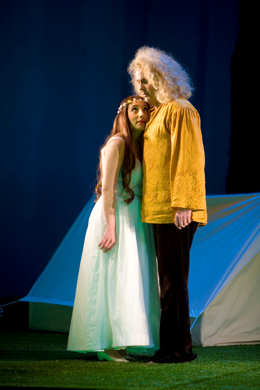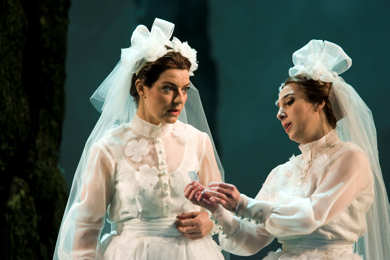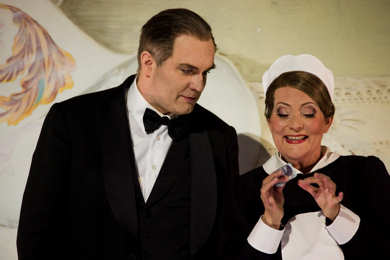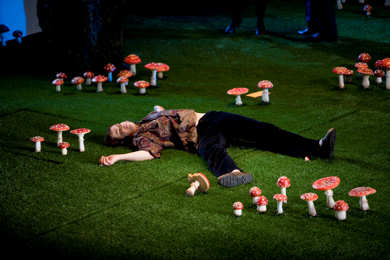|
|
|

Editorial
Board
London Editor:
(London UK)
Melanie
Eskenazi
Regional Editor:
(UK regions and Worldwide)
Bill
Kenny
Webmaster:
Bill
Kenny
Music Web Webmaster:
Len
Mullenger



|
MusicWeb is a
subscription-free site
Clicking Google adverts on our pages helps us keep it that way
Seen
and Heard International Opera Review
Mozart , Così fan tutte
at the Royal Stockholm Opera ( New
Production) 12.5.2007(GF)
Production:
Directed and staged by Ole Anders
Tandberg
Costumes: Maria Geber
Lighting: Ellen Ruge
Cast:
Maria Fontosh – Fiordiligi
Susann Végh – Dorabella
Peter Mattei – Guglielmo
Jonas Degerfeldt – Ferrando
Hilde Leidland – Despina
Gunnar Lundberg – Don Alfonso
The Royal Opera Chorus and Orchestra/Okko
Kamu

The Royal Stockholm Opera’s new
production of Così fan tutte is
a Così to out-Così any
other Così! These are strong
words indeed and I am going to give
cause for them within the next
paragraph or two, but before that a
short retrospect is justified.
It was written at the request of
Emperor Joseph II to a libretto by
Lorenzo Da Ponte, who obviously wasn’t
too proud of it. In his Memoirs
he mentions it only in passing, and
then by its sub-title La scuola
degli amanti as ‘an opera that
holds third place among the three
sisters born of that most celebrated
father of harmony’ and the only reason
he mentions it seems to be that he
wrote the leading role to be sung by
his mistress. The opera is probably
based on a similar occasion in Trieste
at about the time but it also seems
that Da Ponte drew some details from
plays by Tirso de Molina – as he of
course did to much larger extent for
his Don Giovanni libretto.
Mozart composed the music in amazingly
short time, mostly during December
1789, the first rehearsals were held
on 21 January and the premiere was on
26 January. It was a success and
before the end of the month it had
been played five times, but then
Joseph II died and further
performances were cancelled. After
that it never quite got a foothold in
the repertoire, due primarily to the
fact that the plot was considered to
frivolous, an opinion that was
strongly endorsed by Beethoven. During
the 19th century the
libretto was reworked several times to
make it more palatable but it was not
until well into the 20th
century that the original version was
staged again and then greeted as the
masterpiece it is. Musically and
psychologically that is – there can
still be doubt about the morality and
especially the gender perspective that
the feminist movement rightly could
find reason to attack.

Bearing all this in mind Ole Anders
Tandberg has made a hilariously
colourful and entertaining play where
he turns almost everything upside down
and invites the audience to a
hide-and-seek game where every new
scene makes the viewer exclaim: He did
it again! As so often with today’s
performances, the director deviates
from the intended time of the play and
in this case all kinds of times appear
more or less simultaneously: the two
sisters are innocently dressed in
white, seemingly 18th
century, unless they are in petticoats
of indeterminable period. The two
fiancés make their first appearance in
white bath towels and then, in the
full glare of publicity, put on
timeless tails, only to disappear when
they are called to arms and return in
modern military outfit, including
machine-guns. When they return as
Albanians, as the original libretto
has it, they are instead hash-smoking
hippies in hair-raising wigs. The two
wire-pullers, Don Alfonso and Despina,
are of course in impeccable servants’
outfit, as is the rest of the staff.

The sets are picture-book like in
bright colours. Most of the time we
are in a garden with an invitingly
green lawn filled with junipers or
whatever trees they are supposed to
be. But much of the action also plays
in front of the curtain, which shows
sundry more or less risqué
motifs.
The action, like the sets, is filled
with inventive twists and turns and
rarely have I encountered so much
inventiveness: elegant, sophisticated,
daring - even a mite vulgar at times -
and I believe that Mozart would have
appreciated it all, himself a man who
wasn’t foreign to the obscene. The
opera is performed in Italian but the
Swedish translation by Lasse Zilliacus,
shown as surtitles, is updated and
sometimes broadly colloquial.
I could go into a detailed account of
the ingenuity of the action and the
sets but that would rob the intended
visitor of the joy of experiencing all
this first hand. Suffice it to say
that during the overture Tandberg sets
the seal on the production in the
shape of a hilarious pantomime with
Don Alfonso shining shoes in time with
the music, much the same way as
Chaplin shaved a customer in The
Dictator, and servants run back
and forth, several of them after a
while busily mowing the lawn. When the
Albanians take poison to gain
compassion from the sisters, in this
production they partake of poisonous
fly agaric – another stroke of genius!

All this jollity doesn’t exclude some
more serious strokes, most prominent
at the beginning of Act II, but the
remaining impression is still a
light-hearted atmosphere where all’s
well that ends well.
Finnish conductor Okko Kamu isn’t
particularly known as a classicist and
some heavier rubatos than usual reveal
that he is a romantic at heart, but
considering the sets and the action
this is part and parcel of the
performance at large and his feeling
for choosing sensible tempos is never
in question. The Royal Orchestra play
with accustomed finesse and the Opera
Chorus sing what little they have to
sing with flair. Their main object is
however to act as servants which they
do with obvious relish.
Relish is also a suitable word for the
six soloists. They can’t hide the fact
– and why should they? – that they
probably enjoy this production just as
much as the director does and they
throw themselves whole-heartedly into
whatever whimsy Tandberg incites them
to. Gunnar Lundberg, who impresses
more and more for every time I see
him, is a scheming Don Alfonso with
superb timing, Hilde Leidland is just
cut out for Despina and she is
suitably over the top when disguised
as doctor or notary. Jonas Degerfeldt
and Peter Mattei are superb as
Ferrando and Guglielmo and especially
the tall and lanky Mattei has a
marvellously expressive body language.
As Fiordiligi and Dorabella Maria
Fontosh and Susann Végh could hardly
be bettered, lovely creatures both and
still with a mind of their own. As for
the singing little else could also be
wished. Jonas Degerfeldt’s once light
lyrical tenor – I first heard him
thirteen years ago as participant in
the Jussi Björling Tenor Competition –
has filled out and he will probably
move on to more lirico-spinto roles in
due time but he still sounds a bit
strained in Un aura amorosa. I
have praised Maria Fontosh before; she
was a great Tatiana in Stockholm’s
Eugene Onegin. Here she didn’t
seem quite at ease in the beginning of
the opera but she soon warmed up and
produced lovely nuanced singing in her
difficult arias. As her sister, Susann
Végh gave a powerful reading and she
too is heading for heavier repertoire;
she also sings Carmen. Without in any
way diminishing the impression of the
others it has to be said that Peter
Mattei is probably the greatest
baritone to have emerged from this
part of the world for quite some time
and his singing at this stage of his
career is so confident, so expressive
and with beauty of tone and dramatic
bite to place him in the very top
layer among baritones world-wide.
But this performance should be
regarded as an entity where every
piece is essential in the jig-saw
puzzle and I would strongly endorse
every reader of this review to pay a
visit to the Royal Stockholm Opera and
this Così fan tutte. It will
play until the 15th of
June and is scheduled for more
performances during the autumn
semester. A final hint to recording
companies: it is well worth preserving
on DVD – more than most performances I
have seen!
Göran Forsling
Photographs: Mats Bäcker
Back
to the Top
Back to the Index Page
|
Seen and Heard, one of the longest established live
music review web sites on the Internet, publishes original reviews
of recitals, concerts and opera performances from the UK and internationally.
We update often, and sometimes daily, to bring you fast reviews,
each of which offers a breadth of knowledge and attention to performance
detail that is sometimes difficult for readers to find elsewhere.
Seen and Heard
publishes interviews with musicians, musicologists and directors
which feature both established artists and lesser known performers.
We also feature articles on the classical music industry and we
use other arts media to connect between music and culture in its
widest terms.
Seen and Heard
aims to present the best in new criticism from writers with a radical
viewpoint and welcomes contributions from all nations. If you would
like to find out more email Regional
Editor Bill Kenny. |
|
| |
|
Contributors: Marc
Bridle, Martin Anderson, Patrick Burnson, Frank Cadenhead, Colin
Clarke, Paul Conway, Geoff Diggines, Sarah Dunlop, Evan Dickerson
Melanie Eskenazi (London Editor) Robert J Farr, Abigail Frymann,
Göran Forsling, Simon Hewitt-Jones, Bruce Hodges,Tim Hodgkinson,
Martin Hoyle, Bernard Jacobson, Tristan Jakob-Hoff, Ben Killeen,
Bill Kenny (Regional Editor), Ian Lace, John Leeman, Sue Loder,Jean
Martin, Neil McGowan, Bettina Mara, Robin Mitchell-Boyask, Simon
Morgan, Aline Nassif, Anne Ozorio, Ian Pace, John Phillips,
Jim Pritchard, John Quinn, Peter Quantrill, Alex Russell, Paul
Serotsky, Harvey Steiman, Christopher Thomas, Raymond Walker, John Warnaby,
Hans-Theodor Wolhfahrt, Peter Grahame Woolf (Founder & Emeritus
Editor)
|
Site design: Bill Kenny
2004 |

